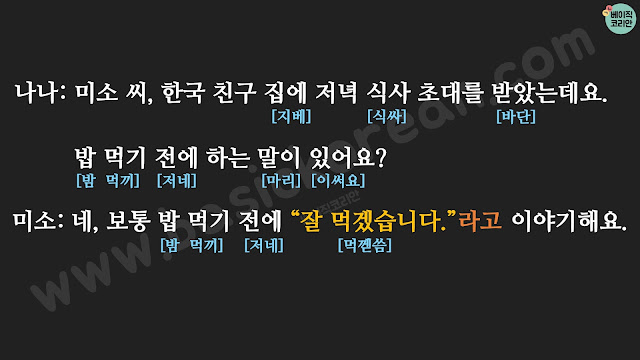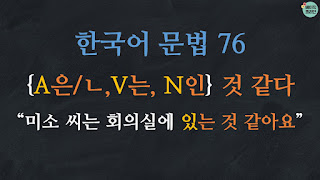Learn Korean | Korean Grammar 126: Direct Quotation "..."-라고/이라고 (라고 하다/라고 말하다)
In this lesson, we’re going to learn '-라고/이라고’ which is used to quote someone's words directly.
밥 먹기 전에 "잘 먹겠습니다"라고 말해요.
(We say "I'll enjoy the meal." before eating.)
If you want to watch this lesson in Korean with English subtitles, please click the link below.
⭐️Korean Grammar 126: “…”-이라고/라고 (Direct quotation)
1. A short conversation '-이라고/라고' with pronunciation
- 나나: 미소 씨, 한국 친구 집에 저녁 식사 초대를 받았는데요. 밥 먹기 전에 하는 말이 있어요?
- 미소: 네, 보통 밥 먹기 전에 “잘 먹겠습니다.”라고 이야기해요.
(English Translation)
- Nana: Miso, I was invited to dinner at a Korean friend's house. Do you have anything to say before eating?
- Miso: Yes, we usually say “I’ll enjoy the meal.” before eating.
Here, the grammar we will learn today is ‘“잘 먹겠습니다”라고.’
Let's find out today's grammar.
2. Usage '라고/이라고'
 |
| Korean Direct Quotation Usage -라고/이라고 |
- '라고/이라고' is used after the word you want to quote directly.
- It indicates that the preceding word is quoted exactly as it was originally spoken.
- So it is used when quoting something directly: It is used to quote directly what someone said or certain phrases.
- We use "quotation marks (큰따옴표)" around quoted sentences to show that we are quoting the text directly.
- Usually after '-라고/이라고', certain verbs such as ‘말하다 (to talk), 묻다 (ask), 생각하다 (think), 쓰다 (write), 하다 (do)/그러다(do so)’ follows.
3. Example Sentneces of '라고/이라고'
✎ 미소: 한국 사람들은 밥 먹기 전에 “잘 먹겠습니다.”라고 말해요. (“잘 먹겠습니다.” + 라고)
(Miso: Koreans say before eating "I'll enjoy the meal.)- Koreans say this before eating. "잘 먹겠습니다." (I will enjoy this food.)
- Miso wants to say these words to Nana as it is.
- Then add '라고' after ”잘 먹겠습니다.”
- Then you can say, 한국 사람들은 밥 먹기 전에 “잘 먹겠습니다.”라고 말해요.
- Here, '"잘 먹겠습니다”라고' is a combination of the sentence "잘 먹겠습니다." and '라고.'
- When you quote someone's words directly, you can use '라고' after the words you want to quote - "잘 먹겠습니다."
✎ 미소: 도서관에 “금연”이라고 적힌 표지판이 있어요. (“금연” + 이라고)
(Miso: There's a sign in the library that says "금연 (No Smoking)".)- There is a "금연 (No Smoking)" sign in the library.
- Miso wants to tell Nana what is written on the sign.
- Then you can add '이라고' after the word "금연.”
- Then you can say, 도서관에 “금연”이라고 적힌 표지판이 있어요.
- Here,'"금연”이라고’ is a combination of the word '금연' and '이라고.'
3. Combination Information '라고/이라고'
(1) Final Consonant O: -이라고
- When the last letter of the word you want to quote has a consonant, use '-이라고.'
1) 금연 + 이라고 → “금연”이라고
- When you look at ‘금연’, there is the final consonant in ‘연.’
- Then '-이라고' is used after that.
- So it becomes ‘“금연.”이라고.’
2) 수업 중 + 이라고 → “수업 중”이라고
- When you look at ‘수업 중’, there is the final consonant in ‘중.’
- Then '-이라고' is used after that.
- So it becomes ‘“수업 중”이라고.’
(2) Final Consonant X: -라고
- On the other hand, when the last letter of the word you want to quote does not have a consonant, use '-라고.'
1) 사랑해요. + 라고 → “사랑해요.”라고
- When you look at ‘사랑해요’, there is not final consonant in ‘요.’
- Then '-라고' is used after that.
- So it becomes ‘“사랑해요.”라고.’
2) 감사합니다. + 라고 → “감사합니다.”라고
- When you look at '감사합니다', there is no final consonant in '다.'
- Then '-라고' is used after that.
- So it becomes ‘"감사합니다.”라고.'
 |
| Korean Direct Quotation Combination Information -라고/이라고 |
4. More examples '라고/이라고'
1. 영준 씨가 저한테 “좋아해요.”라고 말했어요. (“좋아해요.” + 라고)
2. 지안이가 나에게 “안녕?”이라고 했어요. (“안녕?” + 이라고)
3. 설날에는 “새해 복 많이 받으세요.”라고 인사해요. (“새해 복 많이 받으세요.” + 라고)
(English Translation)
1. Yeongjun said to me, “I like you.”
2. Jian said to me, “Hello?"
3. We say "Happy New Year." on New Year's Day.
5. A short Conversation 2 '라고/이라고'
- 나나: 그럼, 밥 먹고 나서 하는 말도 있어요?
- 미소: 그럼요. 밥 먹고 나서는 “잘 먹었습니다.”라고 하고요. 보통 음식은 남기지 않고 다 먹는 것이 예의입니다.
(English Translation)
- Nana: Then is there anything you say after you eat?
- Miso: Sure, Sure. We say "I really enjoyed the meal." after eating. And usually, it is courtesy that you eat all of the food without leaving any leftovers.
→ “Here, the grammar we've learned is ‘“잘 먹었습니다”라고’
'"잘 먹었습니다."라고' is the combination of the sentence "잘 먹었습니다." and '라고.'
Today we've learned '라고/이라고' that indicates the preceding word is directly quoted.
That's all for today.
Bye!
#베이직코리안 #한국어문법 #Basickorean #Koreangrammar #라고 #이라고 #직접인용 #한국어직접인용 #Koreandirectquotation


_basickorean.jpg)

